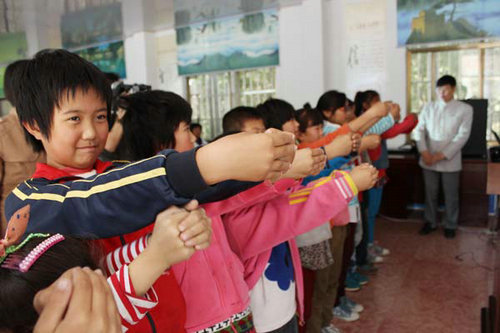
Children learn gestures to pay homage to Confucius in Sishui, Shandong province. Wang Kaihao/ China Daily
The first sound one hears in the morning after waking up at a traditional Chinese college in Shengshuiyu township is the loudspeaker broadcast of Di Zi Gui. The book, written in 17th century and based on the teachings of Confucius, emphasises the basic requisites for being a good person and guidelines for living in harmony with others.
Visitors from large cities who are used to be honked at will be pleasantly surprised to find local drivers smiling patiently as they wait for pedestrians to cross the street. This tranquil mountainous township in Sishui county, southern Shandong province, is the birthplace of Confucius (551-479 BC).
Today, it is a hub for the revival of his teachings.
Mid-October is the busiest time for farming in Shandong, but a classroom at Nishan Shengyuan (which literally means "origins of the sacred") College where Confucianism is being taught is full.
The Confucian lecture was first started on a trial basis in 2012. At the time, the classroom was half empty, and cellphones rang constantly, recalls Meng Shaofeng, head of the township.
"Though people in big cities have paid much more attention to Confucianism and the preservation of traditional culture, our villagers thought the philosophy was too remote from their lives. We had to use free gifts like towels or soap to get people to come."
But by the third day of the lecture, the atmosphere changed, and the villagers became quiet. Some even cried. "Many young people used to treat their parents badly," says local villager Chen Shoucai, 62. "It's a shame our generation had no chance to learn Confucianism when we were young, even though I live beside Confucius' birthplace."
Since last year, when Confucianism lectures were officially introduced into the township, "people have become aware of how important it is to be filial and courteous", Chen says. "My son, who works in a city, is away from home for half a year, and was detached from me. But now he cares about me much more.
"Villagers now show more concern about keeping the environment clean, thanks to the teachings of Confucius."
Six branches of the lecture series have been established across the township, covering its 60 villages. Confucian teachings were heavily criticized during the "cultural revolution" (1966-76). But recently, the country's top leaders have emphasized the importance of his teachings. In September, President Xi Jinping attended a ceremony in Beijing to celebrate Confucius' birthday.
"Many young and middle-aged people in the countryside go to the big cities to work, leaving their parents and children at home," says Qian Yuzhen, a retired teacher who delivers lectures on Confucianism.
"Our lectures even attract some Christian villagers. Though the beliefs are different, the emphasis on love, inner peace and courtesy is common. They find emotional resonance in the teachings."
Yan Binggang, deputy head of Advanced Institute for Confucian Studies at Shandong University, is behind the project to revive Confucianism in rural China. "The teachings must come out of the ivory tower to reach people in the countryside, who are often not educated," he says.
"Confucianism is always in Chinese people's blood, no matter how the social structures change. What we want to do is to awaken that essence hidden in everyone's heart."
Yan goes to the township twice a month to give lectures for free. His team, which is made up of about 10 people, includes college professors and school teachers. "We're starting everything from scratch. We cannot push too hard. We can only begin with those partsthat are close to people's lives, like guiding them to be filial and caring. But our goal is far beyond that. We want a self-sufficient system after we leave."
Several other cities in Shandong have also adopted similar programs. The province's cultural department allocated 13 million yuan ($2.12 million) this year to support the teaching of Confucianism.
Yan says some South Korean scholars have shown interest in starting similar projects in their country.
We recommend:

|

|

|
|
Traditional artworks on display at intangible cultural heritage exhibition
|
The 11th China (Changzhou) International Animation Art Week opens
|
Broadway-themed musical ‘Kung Fu Hero’ in Houston
|
